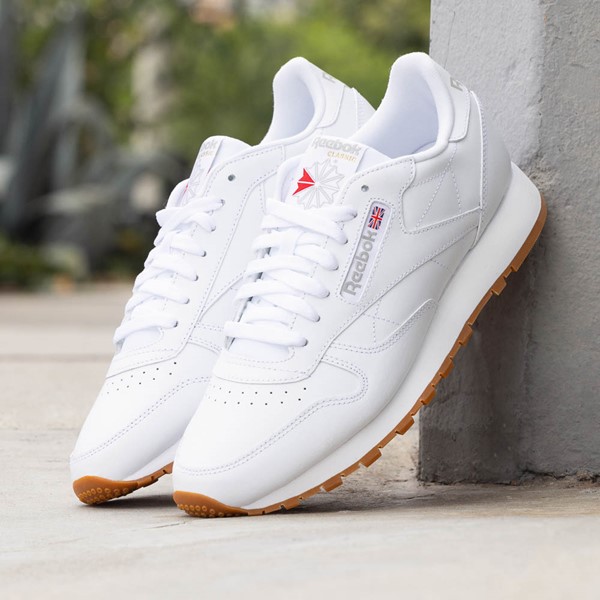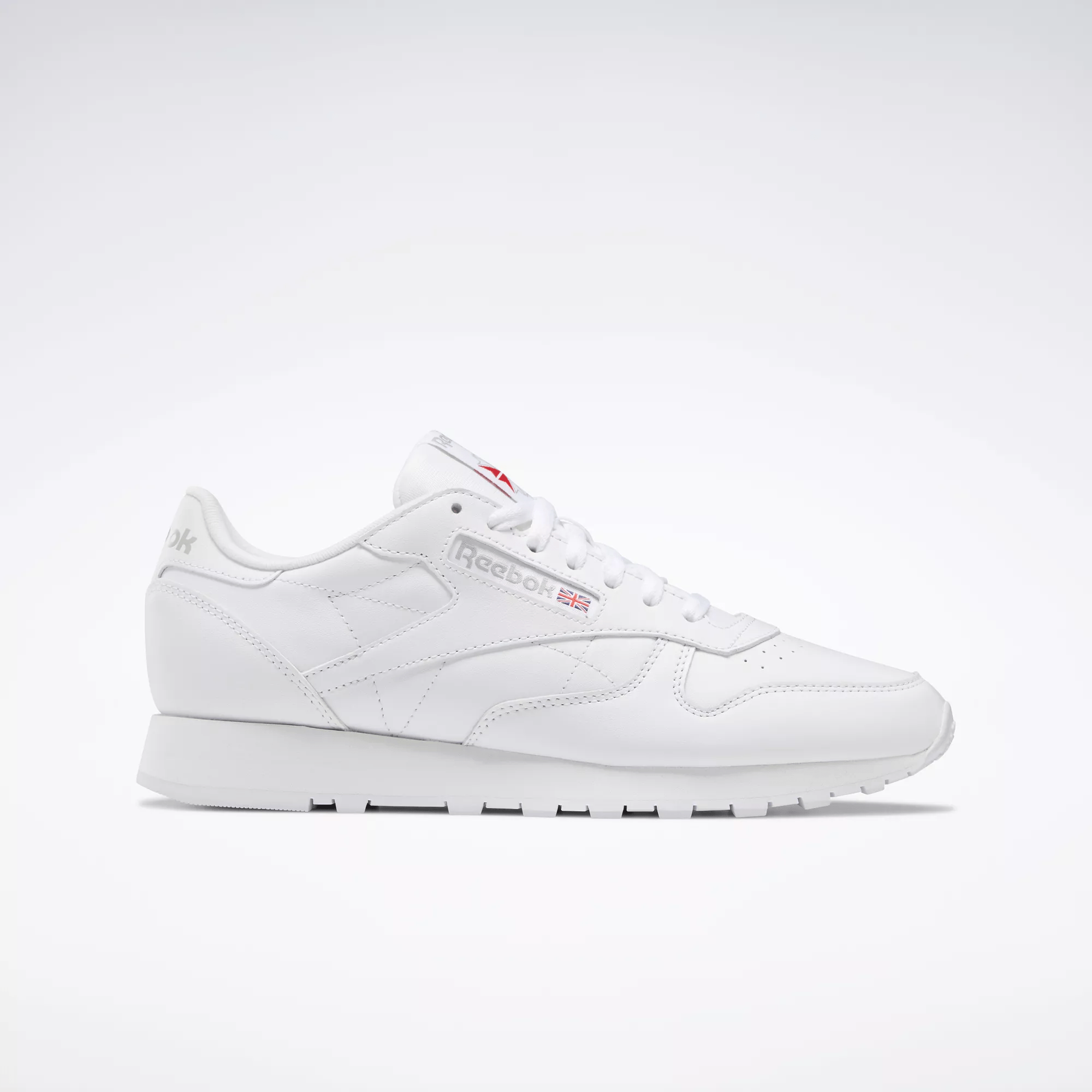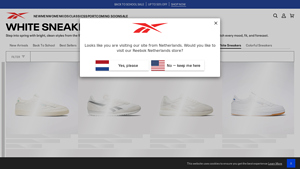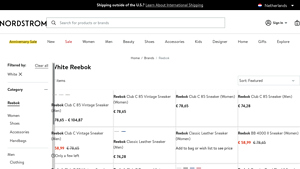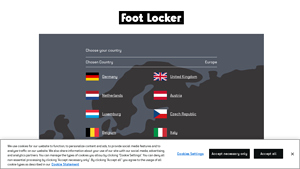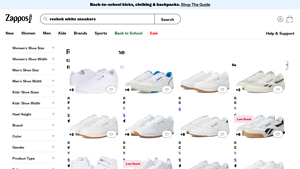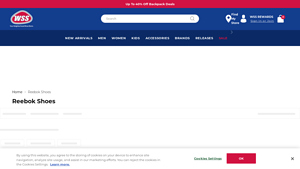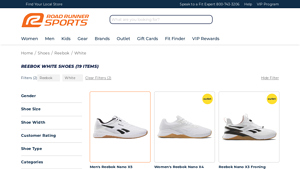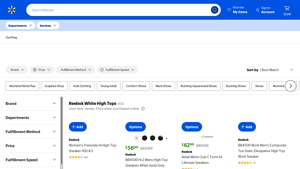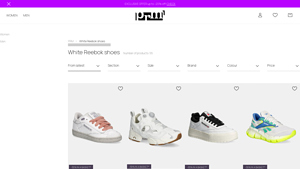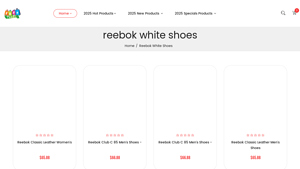White Reebok Shoes Guide: Type,Cost,Material…
Introduction: Navigating the Global Market for white reebok shoes
In today’s dynamic retail landscape, sourcing white Reebok shoes presents a unique challenge for international B2B buyers. With a surge in demand for versatile and stylish footwear across various markets, businesses must navigate a competitive environment to find suppliers that offer quality, affordability, and timely delivery. This comprehensive guide delves into the diverse range of white Reebok shoes available, from classic styles to contemporary designs, catering to various demographics including men, women, and children.
We will explore critical aspects such as supplier vetting processes, pricing strategies, and the specific applications of these shoes in different markets, ensuring that buyers are equipped with the knowledge needed to make informed purchasing decisions. By addressing the unique needs of international buyers from regions like Africa, South America, the Middle East, and Europe, this guide aims to empower businesses to capitalize on emerging trends and consumer preferences.
Whether you are looking to enhance your retail offerings or seeking bulk purchases for promotional events, understanding the intricacies of the white Reebok shoe market can significantly impact your bottom line. With insights into sourcing strategies and market dynamics, you will be well-prepared to make choices that align with your business goals and customer expectations.
Understanding white reebok shoes Types and Variations
| Type Name | Key Distinguishing Features | Primary B2B Applications | Brief Pros & Cons for Buyers |
|---|---|---|---|
| Reebok Classic Leather | Timeless design, smooth leather, excellent durability | Retail, promotional giveaways, corporate uniforms | Pros: Versatile style, high customer satisfaction. Cons: Can be pricier than synthetic options. |
| Reebok Club C 85 | Retro aesthetic, cushioned sole, lightweight construction | Fashion retail, lifestyle branding | Pros: Trendy appeal, good for casual wear. Cons: Limited performance for athletic use. |
| Reebok Nano X | Engineered for performance, breathable mesh upper | Sports teams, fitness centers, athletic promotions | Pros: High performance, suitable for training. Cons: May not appeal to fashion-focused buyers. |
| Reebok Freestyle Hi | High-top design, iconic style, supportive ankle coverage | Youth fashion retailers, lifestyle brands | Pros: Strong brand recognition, unique style. Cons: Less versatility for formal settings. |
| Reebok ATR Chill | Lightweight, versatile for various activities | Outdoor retailers, casual wear collections | Pros: Multi-functional, comfortable. Cons: Limited brand recognition compared to Classics. |
What Are the Key Characteristics of Reebok Classic Leather Shoes?
The Reebok Classic Leather is a staple in the sneaker industry, characterized by its timeless design and smooth leather construction. This shoe is known for its durability and classic aesthetic, making it suitable for both casual and formal occasions. B2B buyers often select this model for retail environments, promotional giveaways, or corporate uniforms due to its universal appeal and high customer satisfaction ratings. While it may carry a higher price point compared to synthetic alternatives, the longevity and style make it a worthy investment.
How Does the Reebok Club C 85 Stand Out in the Market?
The Reebok Club C 85 is celebrated for its retro aesthetic and lightweight cushioning, catering to a fashion-forward audience. This sneaker is ideal for lifestyle branding and retail environments that focus on casual wear. Buyers appreciate its trendy appeal, which resonates well with younger consumers. However, it’s important to note that while the Club C 85 excels in style, it may not provide the same level of performance for athletic activities, which could limit its appeal in more performance-driven markets.
What Makes the Reebok Nano X a Preferred Choice for Performance?
Engineered for high performance, the Reebok Nano X features a breathable mesh upper and is designed for training and fitness activities. This shoe is particularly suitable for B2B applications involving sports teams, fitness centers, and athletic promotions. Its advanced design ensures comfort and support during intense workouts, making it a favorite among fitness enthusiasts. However, businesses focusing on fashion trends may find that this model lacks the broad appeal of more classic styles.
Why Choose the Reebok Freestyle Hi for Youth Fashion Retail?
The Reebok Freestyle Hi is recognized for its high-top design and iconic style, appealing particularly to youth fashion retailers. Its supportive ankle coverage and bold aesthetic make it a popular choice for lifestyle brands targeting a younger demographic. While the Freestyle Hi enjoys strong brand recognition, its unique style may limit its versatility in more formal settings, which is a consideration for buyers looking to diversify their offerings.
How Does the Reebok ATR Chill Cater to Versatile Needs?
The Reebok ATR Chill is designed for versatility, making it suitable for various activities, from casual outings to light workouts. Its lightweight construction enhances comfort, appealing to outdoor retailers and casual wear collections. While it offers multi-functional benefits, B2B buyers should be aware that its brand recognition may not be as strong as that of the classic models, which could influence consumer purchasing decisions.
Key Industrial Applications of white reebok shoes
| Industry/Sector | Specific Application of white reebok shoes | Value/Benefit for the Business | Key Sourcing Considerations for this Application |
|---|---|---|---|
| Retail | Employee Uniforms | Enhances brand image and employee comfort | Bulk purchasing options, customization for branding |
| Sports & Fitness | Team Sports and Athletic Events | Improves performance and team cohesion | Performance specifications, availability of sizes |
| Hospitality | Staff Footwear for Restaurants and Hotels | Ensures comfort during long shifts, stylish appearance | Durability, ease of cleaning, volume discounts |
| Education | School Uniforms and Athletic Programs | Promotes school spirit and student comfort | Compliance with uniform policies, range of sizes |
| Logistics & Warehousing | Footwear for Warehouse Staff | Provides safety and comfort during long hours | Safety certifications, bulk order capabilities |
How Are White Reebok Shoes Utilized in the Retail Sector?
In the retail industry, white Reebok shoes are often used as employee uniforms, providing a clean and professional appearance. Their stylish design enhances the brand image, while the comfort offered by these shoes ensures that employees can perform their duties without distraction. For B2B buyers, sourcing options should include bulk purchasing and potential customization for branding purposes, ensuring that the footwear aligns with the store’s aesthetic.
What Role Do White Reebok Shoes Play in Sports & Fitness?
In the sports and fitness sector, white Reebok shoes are favored for team sports and athletic events. Their design caters to performance needs, offering stability and comfort during physical activity. Businesses in this sector benefit from improved team cohesion and athlete performance. Buyers should focus on performance specifications and the availability of various sizes to meet team requirements effectively.
How Are White Reebok Shoes Applied in the Hospitality Industry?
In hospitality, white Reebok shoes serve as ideal staff footwear for restaurants and hotels. They combine comfort and style, crucial for employees who work long shifts while interacting with guests. This footwear choice not only enhances the staff’s appearance but also aids in maintaining high service standards. B2B buyers should prioritize durability and ease of cleaning, along with negotiating volume discounts for larger orders.
How Do White Reebok Shoes Benefit Educational Institutions?
Educational institutions often incorporate white Reebok shoes into their uniforms and athletic programs. This footwear promotes school spirit while ensuring students remain comfortable during various activities. For B2B buyers in this sector, compliance with uniform policies is essential, alongside a wide range of sizes to cater to different age groups and preferences.
What Are the Advantages of White Reebok Shoes in Logistics & Warehousing?
In logistics and warehousing, white Reebok shoes are utilized by staff who require comfortable and safe footwear for extended periods. These shoes help reduce fatigue and improve productivity during long hours of work. When sourcing for this application, businesses should consider safety certifications, ensuring that the footwear meets industry standards, and the ability to place bulk orders to accommodate large teams.
3 Common User Pain Points for ‘white reebok shoes’ & Their Solutions
Scenario 1: Sourcing Quality White Reebok Shoes for Diverse Markets
The Problem: B2B buyers face significant challenges when sourcing white Reebok shoes, particularly when catering to diverse international markets such as Africa, South America, and the Middle East. Variations in local demand, cultural preferences, and even climatic conditions can complicate the selection process. Buyers often struggle with ensuring that the products they procure meet local consumer expectations while maintaining the quality and authenticity associated with the Reebok brand. The risk of overstocking unpopular styles or sizes can lead to financial losses and logistical headaches.
The Solution: To effectively source white Reebok shoes, buyers should conduct thorough market research to understand local trends and preferences. This includes analyzing demographic data and consumer behavior in target regions. Establishing relationships with local distributors who have insights into regional demand can also provide a competitive edge. Additionally, consider leveraging data analytics tools to forecast demand accurately and optimize inventory levels. Implementing a flexible procurement strategy that allows for quick adjustments based on market feedback can help minimize risks associated with overstocking or understocking.
Scenario 2: Addressing Quality Control Issues with Imported Footwear
The Problem: A common pain point for B2B buyers is the inconsistency in quality control when importing white Reebok shoes from various manufacturers or suppliers. Variations in manufacturing practices can lead to discrepancies in shoe quality, sizing, and comfort. This inconsistency not only affects customer satisfaction but also tarnishes the reputation of businesses that rely on these products for resale.
The Solution: To mitigate quality control issues, buyers should establish clear quality assurance protocols with suppliers before placing bulk orders. This includes setting specific criteria for product specifications, packaging, and labeling. Conducting factory audits and requesting samples before the full production run can provide insight into the manufacturing processes and quality levels. Additionally, consider implementing a quality control checklist to inspect products upon arrival. Building a long-term partnership with reliable suppliers who prioritize quality can further enhance product consistency and reliability.
Scenario 3: Managing Returns and Exchanges Effectively
The Problem: Returns and exchanges present a significant challenge for B2B buyers of white Reebok shoes, particularly given the global nature of their operations. High return rates due to sizing issues or customer dissatisfaction can lead to increased operational costs and complicate inventory management. B2B buyers often find themselves grappling with the logistics of processing returns while striving to maintain customer satisfaction.
The Solution: To manage returns and exchanges more effectively, implement a comprehensive return policy that is clearly communicated to customers. Providing detailed size guides and fit information on product listings can help reduce sizing-related returns. Additionally, consider offering a virtual fitting solution or augmented reality tools that allow customers to visualize the shoes on their feet. Streamlining the return process through a user-friendly online portal can enhance customer experience while reducing the workload on your team. Collaborate with logistics partners who specialize in reverse logistics to ensure efficient handling of returns, ultimately minimizing costs and improving turnaround times.
Strategic Material Selection Guide for white reebok shoes
What Are the Key Materials Used in White Reebok Shoes?
When selecting materials for white Reebok shoes, several factors come into play, including performance, durability, cost, and compliance with international standards. Here, we analyze four common materials used in the production of these shoes: leather, synthetic leather, rubber, and mesh. Each material has unique properties and implications for international B2B buyers.
How Does Leather Contribute to Performance in White Reebok Shoes?
Leather is a traditional material used in many footwear applications, including white Reebok shoes. It offers excellent durability and comfort, conforming well to the foot’s shape. Key properties include high tensile strength and resistance to wear and tear, making it suitable for everyday use. However, leather can be sensitive to moisture, which may lead to degradation over time if not properly treated.
Pros: Leather provides a premium feel and superior breathability. It is also highly durable, offering a long lifespan when maintained correctly.
Cons: The cost of high-quality leather can be significant, and its production process is often more complex than synthetic alternatives. Additionally, leather may not be the best choice in humid climates without proper treatment.
For international buyers, compliance with environmental standards regarding leather sourcing and tanning processes is crucial. Many regions, including Europe and South America, have stringent regulations that must be adhered to.
What Role Does Synthetic Leather Play in White Reebok Shoes?
Synthetic leather, often made from polyurethane (PU) or polyvinyl chloride (PVC), is increasingly popular in footwear manufacturing. This material mimics the look and feel of genuine leather but is generally more resistant to water and stains. Its key properties include flexibility and ease of cleaning, making it suitable for various applications.
Pros: Synthetic leather is typically more affordable than genuine leather and can be produced in various colors and textures. It is also lighter, which can enhance the comfort of the shoe.
Cons: While synthetic leather is durable, it may not offer the same level of breathability as natural leather. Additionally, it can wear out faster under extreme conditions, such as high temperatures.
International B2B buyers should consider the environmental impact of synthetic materials, as some regions have regulations regarding the use of PVC. Compliance with standards such as ASTM for material safety is also essential.
How Does Rubber Enhance the Functionality of White Reebok Shoes?
Rubber is a critical component in the outsoles of white Reebok shoes, providing traction and durability. Its key properties include excellent grip and resistance to abrasion, making it ideal for various surfaces. Rubber can also withstand a range of temperatures, ensuring performance in different climates.
Pros: Rubber outsoles offer superior shock absorption and flexibility, enhancing comfort during wear. They are also relatively low-cost compared to other materials.
Cons: While rubber is durable, it can degrade over time when exposed to certain chemicals or extreme temperatures. Additionally, the manufacturing process can be complex, requiring specific formulations for optimal performance.
For international buyers, understanding the sourcing and production processes of rubber is vital, especially in regions with specific environmental regulations. Compliance with standards such as DIN for rubber properties is also important.
What Advantages Does Mesh Provide in White Reebok Shoes?
Mesh is often used in the upper sections of white Reebok shoes, particularly in models designed for athletic performance. Its key properties include lightweight construction and breathability, allowing for effective moisture management during physical activities.
Pros: Mesh materials are generally inexpensive and can be engineered for specific performance characteristics, such as moisture-wicking and ventilation.
Cons: While mesh is lightweight, it may not provide the same level of durability as leather or synthetic leather. It can also be susceptible to tearing under rigorous use.
International B2B buyers should be aware of the varying quality of mesh materials and the need for compliance with textile standards in different regions. Understanding the specific performance requirements for athletic footwear is crucial for making informed purchasing decisions.
Summary of Material Properties for White Reebok Shoes
| Material | Typical Use Case for white reebok shoes | Key Advantage | Key Disadvantage/Limitation | Relative Cost (Low/Med/High) |
|---|---|---|---|---|
| Leather | Uppers and linings | Premium feel and breathability | Sensitive to moisture | High |
| Synthetic Leather | Uppers and linings | Affordable and easy to clean | Less breathable than leather | Medium |
| Rubber | Outsoles | Excellent grip and shock absorption | Can degrade with chemicals | Low |
| Mesh | Uppers for athletic models | Lightweight and breathable | Less durable under rigorous use | Low |
This strategic material selection guide provides B2B buyers with essential insights into the materials used in white Reebok shoes, helping them make informed purchasing decisions that align with their regional requirements and market demands.
In-depth Look: Manufacturing Processes and Quality Assurance for white reebok shoes
What Are the Key Stages in the Manufacturing Process of White Reebok Shoes?
The manufacturing process for white Reebok shoes involves several critical stages, each essential to ensuring the final product meets the brand’s quality standards. The main stages include material preparation, forming, assembly, and finishing.
Material Preparation: What Materials Are Used and How Are They Processed?
Material preparation begins with the selection of high-quality materials, such as leather, synthetic fabrics, rubber, and foam. Each material is sourced from suppliers who meet strict criteria to ensure consistency and performance. After sourcing, materials undergo various treatments. For instance, leather may be tanned and dyed to achieve the desired color and texture. This stage is crucial as it impacts the durability and comfort of the shoes.
How Are White Reebok Shoes Formed?
The forming stage involves cutting the prepared materials into specific patterns. Advanced technologies, such as computer-aided design (CAD) and automated cutting machines, are often utilized to enhance precision and reduce waste. Once the materials are cut, they are shaped into components like the upper, lining, and sole. Techniques such as molding and stitching are employed to create the shoe’s structure. For example, injection molding is commonly used for the rubber soles, ensuring a perfect fit and performance.
What Does the Assembly Process Entail for Reebok Shoes?
In the assembly stage, the various components are brought together. This process includes attaching the upper part of the shoe to the sole, which is often done using strong adhesives or mechanical methods, such as stitching. Quality control checks occur at this stage to ensure proper alignment and fit. Each shoe undergoes a series of assembly line processes, where skilled workers ensure that each pair meets the specified design and quality standards.
What Finishing Techniques Are Applied to White Reebok Shoes?
Finishing involves the final touches that enhance both the aesthetic appeal and functionality of the shoes. This may include polishing, applying protective coatings, and adding branding elements. The shoes are then cleaned and prepared for packaging. Quality assurance checks are performed at this stage to detect any defects, ensuring that only flawless products reach the market.
How Is Quality Assurance Implemented in the Manufacturing of White Reebok Shoes?
Quality assurance (QA) is a critical aspect of the manufacturing process, particularly for B2B buyers looking for reliable suppliers. Reebok adheres to international standards such as ISO 9001, which outlines the requirements for a quality management system. This certification helps ensure consistent quality in products and services.
What Are the Key Quality Control Checkpoints During Manufacturing?
Quality control (QC) is integrated throughout the manufacturing process, with checkpoints established at various stages:
-
Incoming Quality Control (IQC): At this initial stage, raw materials are inspected for defects and compliance with specifications before they enter production.
-
In-Process Quality Control (IPQC): During the manufacturing process, continuous monitoring is conducted to ensure that each step adheres to established standards. This includes checking the alignment of components and the quality of stitching and adhesives used.
-
Final Quality Control (FQC): Once the shoes are assembled and finished, a comprehensive inspection takes place. This includes assessing the overall appearance, functionality, and durability of the shoes. Testing methods such as wear tests, flex tests, and water resistance tests may be employed to ensure performance.
How Can B2B Buyers Verify Supplier Quality Control Practices?
For international B2B buyers, particularly from regions like Africa, South America, the Middle East, and Europe, verifying a supplier’s quality control practices is essential. Here are several strategies:
-
Supplier Audits: Conducting on-site audits allows buyers to evaluate the manufacturing processes and QC practices firsthand. This includes reviewing documentation, observing practices, and ensuring compliance with international standards.
-
Quality Assurance Reports: Requesting regular QA reports from suppliers provides insights into their quality control measures and any improvements made over time.
-
Third-Party Inspections: Engaging third-party inspection services can help verify the quality of products before shipment. These services typically include random sampling and testing to ensure compliance with specifications.
What Are the Nuances of Quality Control for International Buyers?
B2B buyers need to understand that quality control nuances may vary by region. For instance, in Africa and South America, challenges such as supply chain disruptions and varying material quality can impact manufacturing. Therefore, buyers should establish clear communication with suppliers regarding quality expectations and compliance with local regulations.
In the Middle East and Europe, buyers may benefit from stricter regulations and standards, but they must remain vigilant about the supplier’s ability to maintain these standards consistently. It is advisable for buyers to familiarize themselves with local and international regulations, such as CE marking for the European market, which certifies that products meet health, safety, and environmental protection standards.
Conclusion: Ensuring Quality in White Reebok Shoes Manufacturing
In conclusion, the manufacturing processes and quality assurance measures for white Reebok shoes are designed to ensure that every pair meets high standards of quality and performance. By understanding the manufacturing stages, quality checkpoints, and verification methods, B2B buyers can make informed decisions when selecting suppliers. This knowledge not only enhances the potential for successful partnerships but also ensures that the products delivered to the market meet consumer expectations.
Practical Sourcing Guide: A Step-by-Step Checklist for ‘white reebok shoes’
Introduction
This guide serves as a comprehensive checklist for B2B buyers aiming to procure white Reebok shoes. Understanding the nuances of sourcing, from defining specifications to evaluating suppliers, is crucial for making informed purchasing decisions that align with business needs and market demands.
1. Identify Your Target Market
Understanding your target market is essential to ensure the white Reebok shoes meet consumer preferences. Analyze demographics, lifestyle trends, and purchasing behaviors in your region—be it Africa, South America, the Middle East, or Europe. Tailoring your selection to local tastes can enhance sales and brand loyalty.
2. Define Your Technical Specifications
Clearly outline the specifications you require for the white Reebok shoes. This includes size ranges, material quality, and design features that resonate with your target audience. Ensuring these details align with market expectations helps in selecting the right products and avoiding costly returns or dissatisfaction.
3. ✅ Evaluate Supplier Credentials
Before committing to a supplier, thoroughly vet their credentials. Request documentation such as business licenses, quality certifications, and any industry-related accolades. This step is vital to ensure you are partnering with a reputable supplier who adheres to industry standards and practices.
4. Request Product Samples
Always request samples of the white Reebok shoes before placing a bulk order. This allows you to assess the quality, fit, and overall appeal of the products firsthand. Consider factors such as comfort, durability, and style, as these will directly influence customer satisfaction and repeat business.
5. Understand Pricing Structures
Analyze the pricing offered by different suppliers and understand their pricing structures. Look for any hidden costs such as shipping, customs duties, or bulk order discounts. This knowledge will aid in negotiating better deals and ensuring your procurement aligns with your budgetary constraints.
6. Check for Compliance with Local Regulations
Ensure that the white Reebok shoes comply with local regulations and standards in your target markets. Different regions may have specific requirements regarding materials, safety, and labeling. Non-compliance can lead to legal issues and hinder market entry.
7. Plan for Logistics and Distribution
Develop a logistics strategy for the procurement and distribution of white Reebok shoes. Consider factors such as shipping methods, lead times, and warehousing options. A well-structured logistics plan will facilitate smooth operations and timely delivery to your customers, enhancing your service reputation in the market.
By following this step-by-step checklist, B2B buyers can navigate the complexities of sourcing white Reebok shoes effectively, ensuring that they meet the needs of their business and customers while maintaining a competitive edge in the marketplace.
Comprehensive Cost and Pricing Analysis for white reebok shoes Sourcing
What Are the Key Cost Components in Sourcing White Reebok Shoes?
When sourcing white Reebok shoes, understanding the cost structure is essential for international B2B buyers. The main cost components include:
-
Materials: The quality of materials used in production significantly affects the overall cost. White Reebok shoes typically utilize high-quality leather or synthetic materials, which contribute to durability and comfort. The sourcing of these materials from different regions can also influence price due to variations in local market conditions.
-
Labor: Labor costs vary by region and affect the final pricing of the shoes. Countries with lower labor costs, like some in Southeast Asia, may offer more competitive pricing than those in Europe or North America. However, it’s crucial to consider the skill level of the workforce, as this impacts the quality of the finished product.
-
Manufacturing Overhead: This includes expenses related to factory operations, utilities, and equipment maintenance. Efficient manufacturing processes can lower these costs, allowing for more competitive pricing in the marketplace.
-
Tooling: Initial tooling costs for molds and machinery can be substantial, particularly for custom designs or limited editions. These costs are typically amortized over the production run, affecting the pricing for different order sizes.
-
Quality Control (QC): Implementing stringent QC measures ensures that the products meet quality standards, which can also impact costs. Higher QC standards may lead to increased labor hours and material waste, thus elevating the price.
-
Logistics: Shipping costs, customs duties, and insurance are critical in international sourcing. Factors such as distance, shipping method, and Incoterms can significantly alter logistics costs. For instance, air freight is faster but more expensive than sea freight, which can influence delivery timelines and overall pricing.
-
Margin: Suppliers typically add a profit margin to the cost structure. This margin can vary based on the supplier’s market positioning and perceived value of the Reebok brand.
How Do Price Influencers Affect the Sourcing of White Reebok Shoes?
Several factors influence the pricing of white Reebok shoes in the B2B market:
-
Volume and Minimum Order Quantity (MOQ): Bulk orders often come with discounts, making it essential for buyers to negotiate favorable terms. Understanding the MOQ can help buyers manage their inventory and cash flow effectively.
-
Specifications and Customization: Custom designs or specific requirements can lead to increased costs. Buyers should weigh the benefits of customization against the potential for higher expenses.
-
Material Quality and Certifications: The choice of materials and any certifications (e.g., eco-friendly, fair trade) can influence both the cost and marketability of the product. Buyers should ensure that the materials meet their standards and those of their target market.
-
Supplier Factors: The supplier’s reputation, reliability, and production capacity can affect pricing. Engaging with established suppliers may ensure better quality and service, albeit at a potentially higher cost.
-
Incoterms: Understanding Incoterms (International Commercial Terms) is critical for managing shipping responsibilities and costs. They define who is responsible for the shipping, insurance, and tariffs, influencing overall pricing.
What Are the Best Buyer Tips for Negotiating Pricing on White Reebok Shoes?
-
Negotiate Strategically: Leverage bulk purchasing power to negotiate better pricing and payment terms. Building long-term relationships with suppliers can also provide leverage for favorable terms.
-
Focus on Cost Efficiency: Consider the Total Cost of Ownership (TCO), which includes not just the purchase price but also shipping, handling, and potential returns. Analyzing TCO can lead to smarter sourcing decisions.
-
Understand Pricing Nuances for International Markets: Different regions may have varying pricing strategies influenced by local market dynamics, import tariffs, and currency fluctuations. Buyers from Africa, South America, the Middle East, and Europe should stay informed about these factors to ensure competitive sourcing.
-
Be Mindful of Indicative Prices: Prices can fluctuate based on market conditions and seasons. Always seek updated quotes and be prepared for potential changes in pricing.
By understanding these cost components and pricing influencers, B2B buyers can make informed decisions when sourcing white Reebok shoes, ensuring they secure the best value for their investments.
Alternatives Analysis: Comparing white reebok shoes With Other Solutions
Exploring Alternatives to White Reebok Shoes for B2B Buyers
In the competitive landscape of athletic footwear, B2B buyers often seek options that not only meet performance needs but also align with budget constraints and brand requirements. While white Reebok shoes are a popular choice due to their classic design and versatility, exploring alternatives can provide valuable insights into other viable solutions that may better suit specific business needs.
| Comparison Aspect | White Reebok Shoes | Nike Air Force 1 | Adidas Stan Smith |
|---|---|---|---|
| Performance | Good comfort and support, suitable for casual and light athletic use. | Excellent grip and cushioning, designed for various sports. | Known for comfort, durability, and style; ideal for casual wear. |
| Cost | Approximately $80-$90 | Typically around $110-$120 | Generally priced at $100-$110 |
| Ease of Implementation | Widely available globally, easy to source. | Also globally available but may require more lead time due to demand. | Available through various retailers, often with promotional offers. |
| Maintenance | Easy to clean, materials may require more care to maintain whiteness. | Durable but can scuff; cleaning may be necessary to maintain appearance. | Easy to clean, but white color can show dirt easily. |
| Best Use Case | Casual wear, light training, and everyday activities. | Suitable for sports, lifestyle, and urban settings. | Best for casual outings and lifestyle branding. |
Evaluating Alternative Footwear Solutions
Nike Air Force 1
The Nike Air Force 1 has established itself as a staple in both athletic and casual fashion. It boasts superior performance features, including enhanced grip and cushioning, making it suitable for various sports and activities. However, the price point is higher compared to white Reebok shoes, which may be a consideration for budget-conscious buyers. Additionally, while the Nike brand is widely recognized and respected, the demand can lead to supply chain challenges, affecting availability.
Adidas Stan Smith
The Adidas Stan Smith is renowned for its timeless design and comfort, appealing to a broad demographic. It is often used in casual settings but can also be integrated into light athletic activities. The pricing is competitive with Nike, but it may also show wear quickly due to its white color. Maintenance is straightforward, though the need for regular cleaning to preserve its pristine look is a common concern. This shoe works well for brands looking to leverage a classic style in their offerings.
Making the Right Choice for Your Business Needs
When selecting the right footwear solution, B2B buyers should consider multiple factors including performance requirements, budget constraints, and target market preferences. While white Reebok shoes offer a blend of comfort and style at an accessible price point, alternatives like the Nike Air Force 1 and Adidas Stan Smith provide distinct advantages in performance and brand prestige. Ultimately, the choice will depend on the specific use case and brand identity that the buyer aims to project. By carefully evaluating each option, businesses can align their footwear selections with their overall strategy and customer expectations.
Essential Technical Properties and Trade Terminology for white reebok shoes
What Are the Key Technical Properties of White Reebok Shoes?
When considering the procurement of white Reebok shoes, understanding the essential technical specifications is crucial for making informed purchasing decisions. Here are several critical properties to keep in mind:
1. Material Composition
White Reebok shoes are predominantly crafted from high-quality leather, synthetic materials, and rubber. The use of leather ensures durability and comfort, while synthetic materials often enhance breathability. Rubber soles provide traction and support. In B2B transactions, recognizing material grades can help buyers assess product longevity and suitability for specific markets.
2. Sizing and Fit Specifications
Reebok shoes are available in a range of sizes, including options for men, women, and children. Accurate sizing charts and fit specifications are vital for wholesalers and retailers to minimize returns and enhance customer satisfaction. Understanding size tolerance—how much variation is acceptable in manufacturing—can also impact inventory management and sales strategies.
3. Performance Features
Many white Reebok shoes incorporate performance technologies such as cushioning systems, shock absorption, and moisture-wicking properties. For example, models like the Floatride feature advanced cushioning to enhance comfort during prolonged wear. B2B buyers should evaluate these performance features based on target demographics and intended uses, whether for athletic performance or everyday wear.
4. Weight and Flexibility
The weight of a shoe can significantly influence its appeal, particularly in athletic markets. Lightweight designs enhance performance, while flexibility contributes to comfort and usability. B2B buyers should consider these factors in relation to their customer base’s preferences and the competitive landscape.
5. Colorfastness and Care Instructions
Colorfastness refers to how well the white material retains its color over time, especially after washing or exposure to sunlight. Care instructions are equally important, as they dictate how consumers can maintain the shoes. For B2B buyers, understanding these properties can aid in marketing and customer education, ultimately driving sales.
What Are Common Trade Terms Related to White Reebok Shoes?
Familiarity with industry jargon is essential for B2B buyers to navigate the purchasing process effectively. Here are several key terms:
1. OEM (Original Equipment Manufacturer)
OEM refers to a company that produces parts or equipment that may be marketed by another manufacturer. In the context of white Reebok shoes, understanding OEM relationships can be crucial for buyers seeking to source products directly from manufacturers or negotiate favorable terms.
2. MOQ (Minimum Order Quantity)
MOQ is the smallest quantity of a product that a supplier is willing to sell. Knowing the MOQ for white Reebok shoes can help B2B buyers plan their inventory effectively and avoid overstocking or stockouts, which can negatively impact cash flow.
3. RFQ (Request for Quotation)
An RFQ is a document that buyers send to suppliers to obtain pricing and terms for specific products. When interested in white Reebok shoes, B2B buyers should prepare detailed RFQs to ensure they receive comprehensive responses that meet their purchasing criteria.
4. Incoterms (International Commercial Terms)
Incoterms are a set of international rules that define the responsibilities of sellers and buyers in international transactions. Familiarity with Incoterms can help B2B buyers understand shipping costs, risks, and delivery obligations, thus enabling better negotiation of terms when importing white Reebok shoes.
5. Lead Time
Lead time refers to the amount of time it takes from placing an order until the goods are received. Understanding lead times is essential for B2B buyers to manage inventory levels and ensure timely fulfillment of customer orders.
By grasping these technical properties and trade terminology, B2B buyers can enhance their purchasing strategies and ensure successful procurement of white Reebok shoes tailored to their market needs.
Navigating Market Dynamics and Sourcing Trends in the white reebok shoes Sector
What Are the Key Market Trends Influencing the White Reebok Shoes Sector?
The global footwear market, particularly for white sneakers like Reebok shoes, is currently experiencing significant growth driven by several factors. The rising popularity of athleisure and casual wear, especially in regions like Africa, South America, the Middle East, and Europe, has led to increased demand for versatile footwear options. International B2B buyers are particularly keen on sourcing products that blend comfort with style, as consumers seek shoes that can transition seamlessly from casual outings to athletic activities.
Emerging B2B tech trends, such as the use of AI-driven analytics for demand forecasting and inventory management, are reshaping sourcing strategies. Companies are leveraging data to optimize their supply chains, ensuring they can respond quickly to market fluctuations. Additionally, the rise of e-commerce platforms is facilitating direct-to-consumer sales, prompting wholesalers and retailers to adapt their sourcing practices to maintain competitive pricing and availability.
Another significant trend is the growing importance of customization. Buyers are increasingly looking for suppliers who can offer personalized options, from color variations to specific design features. This demand for customization is particularly pronounced in markets such as Brazil and Vietnam, where consumers value unique styles that reflect their personal tastes.
How Are Sustainability and Ethical Sourcing Shaping the White Reebok Shoes Market?
In today’s market, sustainability and ethical sourcing are no longer optional; they are essential. The environmental impact of manufacturing processes and the demand for transparency in supply chains are critical concerns for B2B buyers. For white Reebok shoes, sourcing materials that are both eco-friendly and ethically produced is paramount. Buyers should prioritize suppliers that demonstrate a commitment to reducing carbon footprints and implementing sustainable practices throughout their operations.
Certifications such as Fair Trade, Global Organic Textile Standard (GOTS), and the use of recycled materials are becoming increasingly relevant. These green credentials not only enhance brand reputation but also appeal to a growing segment of environmentally conscious consumers. International buyers should consider partnerships with manufacturers who utilize sustainable materials, such as organic cotton and recycled plastics, in their footwear production. This approach not only mitigates environmental impact but also aligns with consumer values, fostering brand loyalty.
Furthermore, transparency in the supply chain enhances trust and accountability, crucial factors for B2B relationships. Buyers must seek suppliers who openly share information about their sourcing practices and labor conditions, ensuring that their products meet ethical standards.
How Has the History of White Reebok Shoes Influenced Their Current Market Position?
The legacy of Reebok shoes, particularly the iconic white sneaker designs, has played a significant role in shaping their market position today. Originally launched in the early 1980s, Reebok quickly became synonymous with athleticism and style, appealing to a broad demographic. The Classic Leather and Club C models, which have remained popular over the decades, exemplify timeless design and versatility.
This historical significance not only enhances brand equity but also influences current marketing strategies. B2B buyers can leverage Reebok’s rich heritage when promoting these products, emphasizing the brand’s commitment to quality and performance. By aligning with a brand that has a storied past, buyers can instill confidence in their customers and differentiate themselves in a competitive marketplace.
In summary, the white Reebok shoes sector is dynamically evolving, influenced by market trends toward casual wear, sustainability, and ethical sourcing. International B2B buyers must stay informed about these developments to effectively navigate the complexities of sourcing and positioning Reebok products in their respective markets.
Frequently Asked Questions (FAQs) for B2B Buyers of white reebok shoes
-
1. How do I solve sourcing challenges when buying white Reebok shoes internationally?
To overcome sourcing challenges, start by identifying reputable suppliers with experience in exporting white Reebok shoes to your region. Utilize online platforms and trade fairs to connect with manufacturers and distributors. Ensure you verify their credentials, check customer reviews, and request samples to evaluate product quality. It’s also beneficial to establish clear communication channels and understand local regulations regarding imports to streamline the procurement process. -
2. What is the best approach for negotiating prices with suppliers of white Reebok shoes?
The best approach to negotiating prices involves thorough market research to understand competitive pricing for white Reebok shoes. When engaging with suppliers, be transparent about your requirements and expected order volume. Highlight long-term partnership potential to encourage favorable terms. Additionally, consider discussing bulk discounts or flexible payment options, which can enhance your purchasing power and lead to better overall pricing. -
3. What are the minimum order quantities (MOQs) for white Reebok shoes?
Minimum order quantities (MOQs) can vary significantly by supplier, but typically range from 50 to 500 pairs for white Reebok shoes. It’s essential to inquire directly with potential suppliers to determine their specific MOQs. If your needs are lower than the MOQ, consider grouping orders with other buyers or negotiating with suppliers to see if they can accommodate your request, especially for smaller businesses. -
4. How can I ensure quality assurance when sourcing white Reebok shoes?
To ensure quality assurance, implement a rigorous vetting process for suppliers. Request product samples to assess quality and craftsmanship before placing larger orders. Establish quality control measures by defining acceptable quality standards and conducting inspections upon arrival. Additionally, consider using third-party inspection services to audit the production process and verify that the final products meet your specifications. -
5. What payment terms should I expect when buying white Reebok shoes?
Payment terms can vary widely among suppliers, but typical arrangements may include a deposit (usually 30% upfront) and the remaining balance upon delivery. Some suppliers may offer credit terms or payment via letters of credit for established buyers. It’s crucial to clarify payment options and terms upfront to avoid misunderstandings. Consider negotiating terms that align with your cash flow and risk management strategies. -
6. What shipping options are available for international buyers of white Reebok shoes?
International buyers have various shipping options, including air freight for quicker delivery and ocean freight for more cost-effective shipping. The choice depends on your budget, urgency, and shipment size. Work with logistics providers who specialize in international shipping to navigate customs and regulatory requirements effectively. Ensure that you discuss insurance options to protect against potential loss or damage during transit. -
7. Are there customization options available for white Reebok shoes?
Many suppliers offer customization options, such as logo printing, color variations, or specific design elements tailored to your brand. However, customization may require higher MOQs and longer lead times. It’s advisable to discuss your specific needs with the supplier early in the negotiation process to understand their capabilities and any additional costs involved in customization. -
8. How do I vet potential suppliers of white Reebok shoes effectively?
Vetting potential suppliers is critical to ensure reliability and quality. Start by checking their business licenses and certifications to confirm legitimacy. Look for reviews and testimonials from previous clients, and consider requesting references. Additionally, evaluate their production capacity, delivery times, and compliance with international standards. Conducting factory visits or audits can further enhance your confidence in their operations.
Important Disclaimer & Terms of Use
⚠️ Important Disclaimer
The information provided in this guide, including content regarding manufacturers, technical specifications, and market analysis, is for informational and educational purposes only. It does not constitute professional procurement advice, financial advice, or legal advice.
While we have made every effort to ensure the accuracy and timeliness of the information, we are not responsible for any errors, omissions, or outdated information. Market conditions, company details, and technical standards are subject to change.
B2B buyers must conduct their own independent and thorough due diligence before making any purchasing decisions. This includes contacting suppliers directly, verifying certifications, requesting samples, and seeking professional consultation. The risk of relying on any information in this guide is borne solely by the reader.
Top 9 White Reebok Shoes Manufacturers & Suppliers List
1. Reebok – White Sneakers Collection
Domain: reebok.com
Registered: 1994 (31 years)
Introduction: White Sneakers collection from Reebok includes various styles such as Club C, FloatZig, and Classic Leather. The collection features options for men, women, and kids, with a focus on comfort and style. Current promotions include a Back to School sale with up to 50% off, free shipping on orders over $75, and a 15% discount for app downloads. Key styles highlighted are FloatZig, which is noted for c…
2. Reebok – Club C 85 Sneaker
Domain: nordstrom.com
Registered: 1994 (31 years)
Introduction: This company, Reebok – Club C 85 Sneaker, is a notable entity in the market. For specific product details, it is recommended to visit their website directly.
3. Reebok – Limited Edition Iverson Sneakers
Domain: footlocker.com
Registered: 1995 (30 years)
Introduction: This company, Reebok – Limited Edition Iverson Sneakers, is a notable entity in the market. For specific product details, it is recommended to visit their website directly.
4. Reebok – Premier Road Plus VI
Domain: zappos.com
Registered: 1999 (26 years)
Introduction: This company, Reebok – Premier Road Plus VI, is a notable entity in the market. For specific product details, it is recommended to visit their website directly.
5. Reebok – Shoes for Men, Women, & Kids
Domain: shopwss.com
Registered: 2004 (21 years)
Introduction: Reebok | Men’s, Women’s, & Kids’ Shoes
6. Reebok – White Shoes
Domain: roadrunnersports.com
Registered: 1995 (30 years)
Introduction: White Reebok Shoes available at Road Runner Sports include various models such as Reebok Nano X5, Nano X4, Nano X3, Nano Gym, Nano 2.0, and more. Prices range from $79.95 to $219.95, with VIP pricing available for members. Key features include high-quality materials, optimal performance for running, cross-training, and weightlifting. Specific models mentioned are REEBOK® FLOATRIDE ENERGY 3.0, REEB…
7. Walmart – Men’s High Top Basketball Shoes
Domain: walmart.com
Registered: 1995 (30 years)
Introduction: This company, Walmart – Men’s High Top Basketball Shoes, is a notable entity in the market. For specific product details, it is recommended to visit their website directly.
8. Reebok – White Sneakers
Domain: prm.com
Registered: 1996 (29 years)
Introduction: White Reebok shoes available for men and women, featuring various models such as Reebok Classic leather sneakers, Club C Bulc, INSTAPUMP FURY 94, Floatzig 1, and more. Prices range from 56.90 USD to 349.90 USD, with discounts of up to 40% on select items. Notable models include Club C Megacourt (139.90 USD), Classic Leather (116.99 USD), and Club C 85 Vintage (129.90 USD). Additional offers includ…
9. Micropace IT – White Reeboks
Domain: micropaceit.com
Registered: 2013 (12 years)
Introduction: This company, Micropace IT – White Reeboks, is a notable entity in the market. For specific product details, it is recommended to visit their website directly.
Strategic Sourcing Conclusion and Outlook for white reebok shoes
In the ever-evolving landscape of footwear, white Reebok shoes stand out as a versatile and timeless option for consumers across the globe. For international B2B buyers, particularly in regions like Africa, South America, the Middle East, and Europe, strategic sourcing of these products can yield significant advantages. By capitalizing on the popularity of Reebok’s classic styles, such as the Classic Leather and Club C, businesses can meet the growing demand for quality athletic and casual footwear.
Establishing strong supplier relationships and understanding market trends will enhance procurement efficiency and ensure competitive pricing. As consumers increasingly seek products that combine style with functionality, the demand for white sneakers remains robust.
Looking ahead, B2B buyers should focus on diversifying their inventory to include the latest collections and best-selling models, while also considering regional preferences. By aligning sourcing strategies with these insights, companies can position themselves favorably in the market. Embrace the opportunity to enhance your product offerings with white Reebok shoes, and drive your business forward in this dynamic industry.
